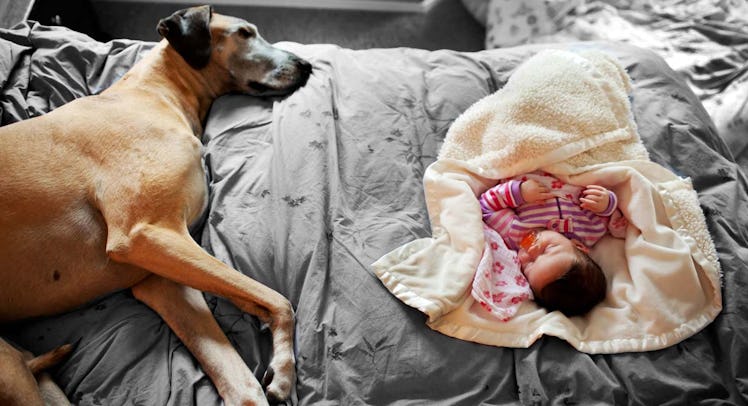How to Introduce Your Dog to Your Baby
It's important to avoid having a ruff go of it.

New parents and parents-to-be who own dogs often wonder how to best go about introducing dog to baby and introducing baby to dog. The truth is that it can be a difficult and occasionally fraught process because babies (and new family members more broadly) stress pets, who receive less attention and have to handle new inputs. Fortunately, there are ways to avoid the many potential pitfalls of this process. Pia Silvani, director of the ASPCA Behavioral Rehabilitation Center and author of “Raising Puppies & Kids Together: A Guide for Parents,” has spent years creating a sort of relationship map for both parents and their furry friends.
Silvani’s first piece of advice is also her weirdest: Go get a doll. The reasoning here is simple. The more time pets have to acclimatize to the weird stuff babies do, the more likely they are to handle the introduction of an actual baby with canine grace.
“They have baby dolls that cry and make similar baby sounds,” says Silvani. “This allows the dog to get used to the parents carrying the baby around. Anything the parent is going to do on a daily basis with the baby they should do with the baby doll and the dog nearby.”
The doll provides noises, sure, but also a pretext for changes to household rules. This is critical so that the dog doesn’t see inevitable changes as the fault of the baby and so that adjustments happen prior to their being any real risk. What are the new rules? Depends a bit on the family, but this one should be universal: Dogs don’t get attention by demanding it.
“If the dog was pet every time he pawed at people’s hands or pushed his head under their elbows, he will not understand why the rules suddenly changed. Parents wrongly think this is a sign of jealousy,” says Silvani. It’s not. The dog is just confused, which is why it pays to start adjusting your behavior and the dog’s expectations before a baby’s arrival.
To help the dog learn to settle and not demand attention, parents-to-be should ignore the dog during periods of time when they are working on the computer or reading a book. It’s a tough ask, but this weans dogs off of specific rewards they may have received in the past for demanding behaviors. Dogs just need to grasp the idea that their relationships are changing. This is why walking around with an empty stroller can help. The dog isn’t going to draw independent conclusions about what’s up but will understand that something is different.
That understanding is critical for when the baby arrives and the dog needs to be trained to interact with its new friend.
That first interaction is particularly fraught and particularly important. There are a few clear rules because dogs and babies are all different, but it is important to greet the dog first after coming home, providing some attention, and then, once the animal has chilled out, introducing the baby into the equation. No matter how great or mellow the dog, this part warrants extra care. Dogs are curious and most of them are a lot bigger than babies. Babies, for their part, are unlikely to fear dogs and somewhat passive participants.
“If the dog is curious about the baby, allow him to sniff the baby’s feet and hands first. Praise the dog or offer treats. If the dog begins to lick the baby, do not reprimand him,” Silvani says, adding that parents should tell the dog to settle, not shame them if the behavior unnerves them. Pulling a dog away from a baby is only going to rile it up.
The work goes both ways. Not only do dogs need to learn how to be around young babies, but babies need to learn how to peacefully coexist with their pets. Silvani suggests “off-limits” areas that are just for the dog so he can get some rest away from your child and you. Having a kid isn’t just exhausting for parents, but for pets as well. Be sensitive to that.
Silvani also stresses that things can go badly for reasons that are hard to understand and out of anyone’s control. She suggests that parents who feel things going that way seek out professional assistance quickly. The stress of having a new child does transfer from parents onto their companions, so having a third party step in can be useful for all concerned. Still, parents-to-be should be heartened by the fact that these introductions often go very well. Babies, speaking in generalities, like dogs, and dogs, speaking in generalities, like babies. More importantly, both dogs and babies like you.
This article was originally published on